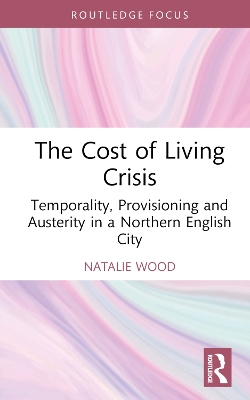Set in the Northern English City of Leeds, in the midst of Liz Truss’ 49 days in office, what we are now calling the Cost of Living crisis emerges as the most recent incantation of economic decline. Challenging the ease with which this phrase has become commonplace, this monograph provokes questions of when and for whom it became normal to discuss the cost of being alive.
The cost of living crisis is both new and not new. With a focus on how economic decline is temporally experienced, Wood explores how consumption habits; find solidarity with the past, claim membership in the present, and grasp at uncertain futures. With a concern for where agency lies, Wood ultimately asks us; How is it that people deal, engage and reclaim precarious futures in the shop? Drawing from research conducted in a food pantry – a food bank that simulates a shop – Wood takes up a concept of provisioning as embodied knowledge and cultivated competence defined by the normalisation of economic recession. However, amidst hopelessness, the food pantry also materialises everyday acts of hope, care and play which in turn perhaps provoke a reimagination not just of what a food bank is but of what shopping could be.
This book is applicable to scholars of temporality, political and economic anthropology, the anthropology of Britain, economic crisis and consumption.
- ISBN13 9781032865447
- Publish Date 31 January 2025
- Publish Status Forthcoming
- Publish Country GB
- Publisher Taylor & Francis Ltd
- Imprint Routledge
- Format Hardcover
- Pages 152
- Language English
